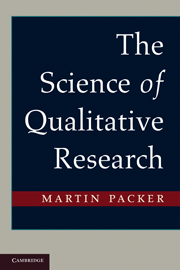Book contents
- Frontmatter
- Contents
- List of Figures and Tables
- List of Boxes
- Acknowledgments
- Introduction
- Part I The Objective Study Of Subjectivity
- Part II Ethnographic Fieldwork – The Focus On Constitution
- 6 Calls for Interpretive Social Science
- 7 Dualism and Constitution
- 8 Constitution as Ontological
- 9 The Crisis in Ethnography
- 10 Studying Ontological Work
- Part III Inquiry With An Emancipatory Interest
- References
- Name Index
- Subject Index
6 - Calls for Interpretive Social Science
- Frontmatter
- Contents
- List of Figures and Tables
- List of Boxes
- Acknowledgments
- Introduction
- Part I The Objective Study Of Subjectivity
- Part II Ethnographic Fieldwork – The Focus On Constitution
- 6 Calls for Interpretive Social Science
- 7 Dualism and Constitution
- 8 Constitution as Ontological
- 9 The Crisis in Ethnography
- 10 Studying Ontological Work
- Part III Inquiry With An Emancipatory Interest
- References
- Name Index
- Subject Index
Summary
We cannot measure such sciences against the requirements of a science of verification: we cannot judge them by their predictive capacity. We have to accept that they are founded on intuitions which we all do not share, and what is worse that these intuitions are closely bound up with our fundamental options. These sciences cannot be wertfrei [value-free]; they are moral sciences in a more radical sense that the eighteenth century understood. Finally, their successful prosecution requires a high degree of self-knowledge, a freedom from illusion, in the sense of error which is rooted and expressed in one’s way of life; for our incapacity to understand is rooted in our own self-definitions, hence in what we are.
Taylor, 1971, p. 57In the 1970s, a number of calls were made for a new kind of interpretive social science that would have ethnography at its center (e.g., Bernstein, 1976; Dallmayr & McCarthy, 1977; Rabinow & Sullivan, 1979). In this chapter I will examine three of these calls: Charles Taylor’s proposal for an interpretive approach to political science, Anthony Giddens’s hermeneutically informed sociology, and Clifford Geertz’s interpretive anthropology. In each case, interpretation – hermeneutics – was regarded as an important, even central, element. In each case, immersion in the social practices of a community – that is to say, ethnographic fieldwork – was considered crucial (though at the same time, as we shall see later, ethnography itself was in crisis). In each case – in sociology, political science, and anthropology – it was claimed that the new approach would resolve core dualisms that had plagued the discipline. And, in each case, it was said that this would be because we would study the key relationship of constitution between humans and the world. This chapter begins our exploration of this notion of constitution, a notion that will lead us to a new way of practicing fieldwork. Once again, it will turn out to be important to get the ontology right.
- Type
- Chapter
- Information
- The Science of Qualitative Research , pp. 123 - 139Publisher: Cambridge University PressPrint publication year: 2010



